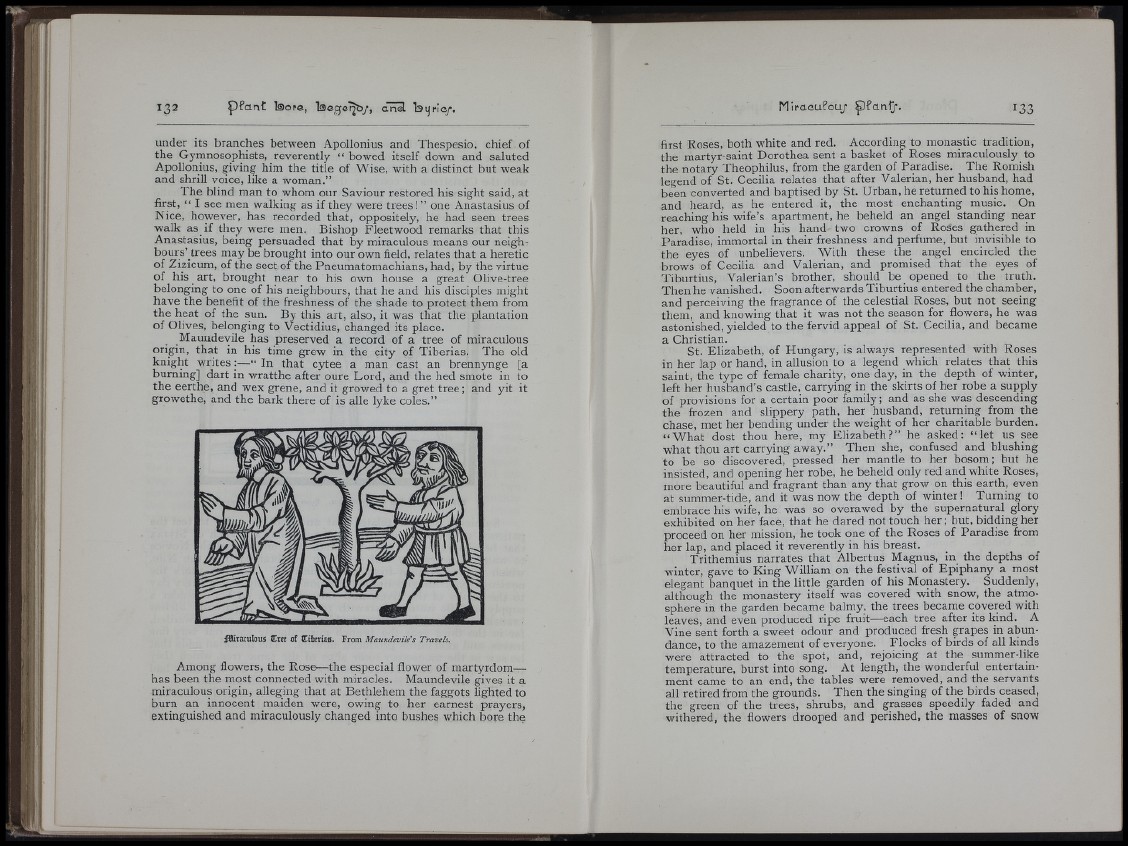
|i
I
'J i
I
under its branches between Apollonius and Thespesio, chief of
the Gymnosqphists, reverently “ bowed itself down and saluted
Apollonius, giving him the title of Wise, with a distinct but weak
and shrill voice, like a woman.”
The blind man to whom our Saviour restored his sight said, at
first, “ I see men walking as if they were trees ! ” one Anastasius of
Nice, however, has recorded that, oppositely, he had seen trees
walk as if they were men. Bishop Fleetwood remarks that this
Anastasius, being persuaded that by miraculous means our neighbours’
trees may be brought into our own field, relates that a heretic
of Zizicum, of the sect of the Pneumatomachians, had, by the virtue
of his _ art, brought near to his own house a great Olive-tree
belonging to one of his neighbours, that he and his disciples might
have the benefit of the freshness of the shade to protect them from
the heat of the sun. B y this art, also, it was that the plantation
of Olives, belonging to Vectidius, changed its place.
Maundevile has preserved a record of a tree of miraculous
origin, that in his time grew in the city of Tiberias. The old
knight writes :—“ In that cytee a man cast an brennynge [a
burning dart in wratthe after oure Lord, and the hed smote in to
the eerthe, and wex grene, and it growed to a gret tree; and yit it
growethe, and the bark there of is alle lyke coles.”
iEiraruIotiS Cktce of CTiijzriaiS. From Maundevile s Travels.
Among fiowers, the RosC'—the especial fiower of martyrdom—
has been the most connected with miracles. Maundevile gives it a
miraculous origin, alleging that at Bethlehem the faggots lighted to
burn an innocent maiden were, owing to her earnest prayers,
extinguished and miraculously changed into bushes which bore the
first Roses, both white and red. According to monastic tradition,
the martyr-saint Dorothea sent a basket of Roses miraculously to
the notary Theophilus, from the garden of Paradise. The Romish
legend of St. Cecilia relates that after Valerian, her husband, had
been converted and baptised by St. Urban, he returned to his home,
and heard, as he entered it, the most enchanting music. On
reaching his wife’s apartment, he beheld an angel standing near
her, who held in his hand two crowns of Roses gathered in
Paradise, immortal in their freshness and perfume, but invisible to
the eyes of unbelievers. With these the angel encircled the
brows of Cecilia and Valerian, and promised that the eyes of
Tiburtius, Valerian’s brother, should be opened to the truth.
Then he vanished. Soon afterwards Tiburtius entered the chamber,
and perceiving the fragrance of the celestial Roses, but not seeing
them, and knowing that it was not the season for flowers, he was
astonished, yielded to the fervid appeal of St. Cecilia, and became
a Christian.
St. Elizabeth, of Hungary, is always represented with Roses
in her lap or hand, in allusion to a legend which relates that this
saint, the type of female charity, one day, in the depth of winter,
left her husband’s castle, carrying iri the skirts of her robe a supply
of provisions for a certain poor family; and as she was descending
the frozen and slippery path, her husband, returning from the
chase, met her bending under the weight of her charitable burden.
“ What dost thou here, my Elizabeth?” he asked: “ let us see
what thou art carrying away.” Then she, confused and blushing
to be so discovered, pressed her mantle to her bosom; but he
insisted, and opening her robe, he beheld only red and white Roses,
more beautiful and fragrant than any that grow on this earth, even
at summer-tide, and it was now the depth of winter! Turning to
embrace his wife, he was so overawed by the supernatural glory
exhibited on her face, that he dared not touch her; but, bidding her
proceed on her mission, he took one of the Roses of Paradise from
her lap, and placed it reverently in his breast.
Trithemius narrates that Albertus Magnus, in the depths of
winter, gave to King William on the festival of Epiphany a most
elegant banquet in the little garden of his Monastery. Suddenly,
although the monastery itself was covered with snow, the atmosphere
in the garden became balmy, the trees became covered with
leaves, and even produced ripe fruit—each tree after its kind. A
Vine sent forth a sweet odour and produced fresh grapes in abundance,
to the amazement of everyone. Flocks of birds of all kinds
were attracted to the spot, and, rejoicing at the summer-like
temperature, burst into song. At length, the wonderful entertainment
came to an end, the tables were removed, and the servants
all retired from the grounds. Then the singing of the birds ceased,
the green of the trees, shrubs, and grasses speedily faded and
withered, the flowers drooped and perished, the masses of snow
¡r !